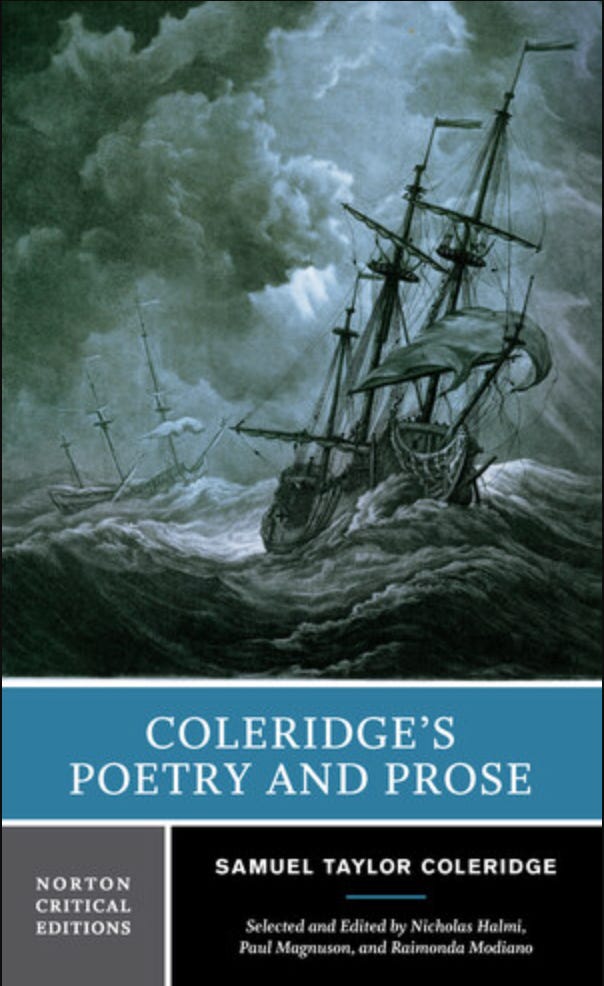Welcome aboard The Bus!
The Stop
Written in 1797, Samuel Taylor Coleridge’s ‘This Lime-Tree Bower My Prison’ is a meditation on what he believed to be the very real power of the imagination. With a shift in tone from philosophical resignation to emphatic exaltation, the poem - one of Coleridge’s conversation poems1 - is a powerful testament to the mind’s capabilities, and contains some of the best descriptions of nature in English Romantic poetry.2
In July 1797, Coleridge was visited at his home in Somerset by William and Dorothy Wordsworth and Charles Lamb, a close friend from Coleridge’s school days at Christ’s Hospital in London. Though excited by their visit and the walks they were planning to take, Coleridge was unable to accompany them due to injuries suffered when his wife - Sara Fricker - accidentally emptied a skillet of boiling milk onto his foot. Unable to walk, Coleridge was confined to a chair in his neighbour’s garden while his friends and wife enjoyed the countryside.
The poem begins with a sense of regret - ‘Well, they are gone, and here must I remain, This lime-tree bower my prison!’ - and at first he (rather melodramatically) worries he ‘may never more meet again’ his friends for a ‘wander in … that still roaring dell’.3 While lamenting this, Coleridge suddenly finds his imagination taking hold and he begins to think about what the others are up to as they stroll around the Somerset landscape. Though physically confined to his ‘lime-tree bower’, throughout the poem’s progression he discovers his accident has actually afforded him the gift of understanding the power of imagination and a profound appreciation for his enforced surroundings. By releasing his mind, imagination has allowed him to take a mental trip with his friends, vicariously sharing in the sights and experiences they (more than likely) have seen - and arguably appreciating them at a depth he wouldn’t have had in person.
Furthermore, Coleridge feels his unfortunate experience has taught him an important moral lesson. At this point in his life he was a Pantheist,4 and would frequently personify Nature as having a godlike power to provide comfort and solace. Stuck at home in his ‘prison’, Coleridge realises that ‘Nature ne’er deserts the wise and pure’, and that his mind, imagination and an appreciation of Nature are sufficient to set him free.
Of course, the best way to appreciate the poem is to read it:
Well, they are gone, and here must I remain
This lime-tree bower my prison! I have lost
Beauties and feelings, such as would have been
Most sweet to my remembrance even when age
Had dimm'd mine eyes to blindness! They, meanwhile,
Friends, whom I never more may meet again,
On springy heath, along the hill-top edge,
Wander in gladness, and wind down, perchance,
To that still roaring dell, of which I told;
The roaring dell, o'erwooded, narrow, deep,
And only speckled by the mid-day sun;
Where its slim trunk the ash from rock to rock
Flings arching like a bridge;—that branchless ash,
Unsunn'd and damp, whose few poor yellow leaves
Ne'er tremble in the gale, yet tremble still,
Fann'd by the water-fall! and there my friends
Behold the dark green file of long lank weeds,
That all at once (a most fantastic sight!)
Still nod and drip beneath the dripping edge
Of the blue clay-stone.
Now, my friends emerge
Beneath the wide wide Heaven—and view again
The many-steepled tract magnificent
Of hilly fields and meadows, and the sea,
With some fair bark, perhaps, whose sails light up
The slip of smooth clear blue betwixt two Isles
Of purple shadow! Yes! they wander on
In gladness all; but thou, methinks, most glad,
My gentle-hearted Charles! for thou hast pined
And hunger'd after Nature, many a year,
In the great City pent, winning thy way
With sad yet patient soul, through evil and pain
And strange calamity! Ah! slowly sink
Behind the western ridge, thou glorious Sun!
Shine in the slant beams of the sinking orb,
Ye purple heath-flowers! richlier burn, ye clouds!
Live in the yellow light, ye distant groves!
And kindle, thou blue Ocean! So my friend
Struck with deep joy may stand, as I have stood,
Silent with swimming sense; yea, gazing round
On the wide landscape, gaze till all doth seem
Less gross than bodily; and of such hues
As veil the Almighty Spirit, when yet he makes
Spirits perceive his presence.
A delight
Comes sudden on my heart, and I am glad
As I myself were there! Nor in this bower,
This little lime-tree bower, have I not mark'd
Much that has sooth'd me. Pale beneath the blaze
Hung the transparent foliage; and I watch'd
Some broad and sunny leaf, and lov'd to see
The shadow of the leaf and stem above
Dappling its sunshine! And that walnut-tree
Was richly ting'd, and a deep radiance lay
Full on the ancient ivy, which usurps
Those fronting elms, and now, with blackest mass
Makes their dark branches gleam a lighter hue
Through the late twilight: and though now the bat
Wheels silent by, and not a swallow twitters,
Yet still the solitary humble-bee
Sings in the bean-flower! Henceforth I shall know
That Nature ne'er deserts the wise and pure;
No plot so narrow, be but Nature there,
No waste so vacant, but may well employ
Each faculty of sense, and keep the heart
Awake to Love and Beauty! and sometimes
'Tis well to be bereft of promis'd good,
That we may lift the soul, and contemplate
With lively joy the joys we cannot share.
My gentle-hearted Charles! when the last rook
Beat its straight path along the dusky air
Homewards, I blest it! deeming its black wing
(Now a dim speck, now vanishing in light)
Had cross'd the mighty Orb's dilated glory,
While thou stood'st gazing; or, when all was still,
Flew creeking o'er thy head, and had a charm
For thee, my gentle-hearted Charles, to whom
No sound is dissonant which tells of Life.
The Detour
Today’s Detour is to a stunning performance of Beethoven’s Piano Concerto No. 3 in C minor by Justus Friedrich Eichhorn. It’s remarkable by any standard, but it just so happens that Eichhorn is only 14. It’s long (47:33), and you’ve got to really like Beethoven to go through it all, but even if you’re Beethoven-agnostic, watch a bit of it just to see Eichhorn in action. He gets started around the 3:50 mark.
Eichhorn: Beethoven Piano Concerto No 3
The Recommendation
Today’s Recommendation is Coleridge’s Poetry and Prose (2003), the Norton Critical Edition of his work. If you’ve been a Bus Rider for some time, you’ll know I’m a fan of these versions of classic literature. Authoritative, accurate and packed with annotations and critical essays both contemporary to the work and well into the current century, they’re indispensable resources for those with more than a casual interest.5 Highly recommended.
The Sounds
Today’s playlist is a selection of five tracks based on the theme of imagination: ‘Imagine’ (John Lennon, 1971), ‘Imaginary Lover’ (Atlanta Rhythm Section, 1978), ‘Just My Imagination (Running Away With Me)’ (The Temptations, 1971), ‘My Imagination’ (The Supremes, 1964) and ‘Just My Imagination (Running Away With Me)’ (The Rolling Stones, 1978).6 Enjoy!
The Thought
Today’s Thought, paraphrased from Coleridge’s Biographia Literaria (1817), expresses his thoughts on the role of imagination:
‘Imagination is the living Power and prime Agent of all human Perception.’
If you have a thought on this Thought - or any part of today’s issue - please leave a comment below:
And that’s the end of this Stop - I hope you enjoyed the diversion!
Thanks to everyone who subscribes - your interest and support is truly appreciated. If you like The Bus, please SHARE it with a friend or two.
If you haven’t climbed aboard The Bus, please do!
If you like The Bus, why not check out other newsletters?
The Sample sends out articles from blogs and newsletters across the web that match your interests. If you like one, you can subscribe with one click.
Until the next Stop …
So-called because of their conversational style and tone, often giving the sense that he’s addressing the reader in an informal chat.
I am a huge fan of Coleridge, and previously looked at him in The Bus Issue 2.35 (30 January 2023) ‘Kubla Khan’. The subject of today’s Stop is a gorgeous poem, filled with philosophical musings and some of the loveliest language in English. If you’re interested, you should also read ‘Reflections on Having Left a Place of Retirement’ and ‘Frost at Midnight’ for starters - but while the language is sumptuous and the general gist is obvious, a good version with annotations to really get the context of what’s going on is invaluable. And there’s nothing wrong with that! Sources for today’s Stop include 'Lime-Tree Bower' (Interesting Literature), 'This Lime-Tree Bower My Prison' (Poetry Foundation), Halmi, Nicholas, Ed., et. al. Coleridge’s Poetry and Prose. Norton (London: 2004), and Abrams, M. H., Ed., et. al. The Norton Anthology of English Literature. Volume 2. 5th Edition. Norton (New York: 1986).
This line and the next several lines describing the dell (in this case, a small tree-filled valley with a stream rushing through it) are among my favourites in all of literature. Coleridge had a unique ability to paint complex images that speak to all the senses in an economy of words.
Pantheism is a belief that identifies god with the universe, or regards the universe as a manifestation of god; that there is a sense of the divine in nature - and that there is an animating presence of the divine in everything.
You don’t need a Norton to read Coleridge - or even buy a book. A great deal of his work is available online at Coleridge (Poetry Foundation).
I realise there are two versions of the same song in this playlist, which is something I try to avoid. However, the difference in the versions by the Temptations and the Stones is so great, it’s as if they’re unrelated.








WOW - blown away by Justus F. Eichhorn! Truly - "...No sound is dissonant which tells of Life." I love the Coleridge poem and allowing, freeing, imagination to guide the spirit. Great post.